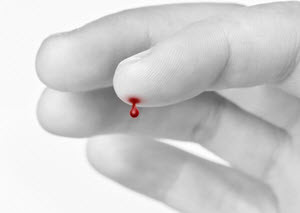 Last week a client of mine presented to our session together with this issue: Two days prior to our weekly Thursday meetings, he was out walking his dog in the park directly across the street from his residence. Along the way, the dog “did his business,” and while in the process of scooping up the excrement, this man’s hand made contact with the ground and he immediately felt a prick on his right index finger. He searched in earnest for the offending object that “violated his finger,” as he put it; and when he didn’t find the culprit via his own efforts, he enlisted the help of his wife. The two of them, he reported, were digging in the earth from 10-10:30pm with the aid of a flashlight. He added that his wife thought the whole incident and their search for what might have stuck his finger to be ridiculous, that he was worrying needlessly and was probably pricked by a thorn of some sort. Their collective effort found nothing.
Last week a client of mine presented to our session together with this issue: Two days prior to our weekly Thursday meetings, he was out walking his dog in the park directly across the street from his residence. Along the way, the dog “did his business,” and while in the process of scooping up the excrement, this man’s hand made contact with the ground and he immediately felt a prick on his right index finger. He searched in earnest for the offending object that “violated his finger,” as he put it; and when he didn’t find the culprit via his own efforts, he enlisted the help of his wife. The two of them, he reported, were digging in the earth from 10-10:30pm with the aid of a flashlight. He added that his wife thought the whole incident and their search for what might have stuck his finger to be ridiculous, that he was worrying needlessly and was probably pricked by a thorn of some sort. Their collective effort found nothing.
In our weekly meeting together this issue came up. His major concern was that he might have encountered an infected needle – which had him worrying that he could be exposed to HIV or Hepatitis C. When I inquired as to whether he had contacted his physician or presented to any hospital emergency room, he said no. This man has a prolonged history of Generalized Anxiety. He worries at length about things he perceives as troublesome but can’t be validated as worthy of the attention he’s giving them.
When working with a client caught in the grip of chronic GAD, be aware that logic won’t work. If I were to say to this client that what happened to him was “probably nothing,” he would challenge me back by telling me that there’s no way I could know for sure. So that’s a trap I need not fall into. Instead, I asked him this question: “What’s the positive intention for your worrying about this incident, given that you have been unable to determine what stuck you and you’re having NO ill effects from it? He told me that worrying about it has him feeling that he is doing something about it, not just blowing the whole incident off as if it were nothing, and that if he did become sick, at least he could say to himself that he remained concerned.
People with GAD want it both ways. What I mean is that they want to reserve the right to worry about something but not do anything objective about remedying the situation they’re faced with. They spin their wheels, allowing the worry to consume much of their time, only to replace a current worry with another one. The worry itself becomes their only reward, because there is no other recognizable payoff. This fellow could at least have gone to the emergency room – even in the absence of any evidence of what penetrated his skin – and discussed what happened with a doctor. This could have allayed his fears and provided him with reassurance that he could set aside concerns about infection.
In future sessions with this guy, I’ll reinforce that he’ll be faced with one uncertainty after another and that his anxious mind will be calmed, if and only if he develops a clear plan of action for addressing his worries head-on, as soon as they enter his mind. I’ll teach him how to distinguish what IS a problem from what MIGHT be a problem, how to sort out what is real and within his control from what isn’t, and how to make a plan for the “what” and the “what ifs” that bring him consternation.
He will then have a couple of options – continue to invest in problems vis-à-vis worry, or invest in their possible solutions.
That choice will be his.





Leave A Comment
You must be logged in to post a comment.